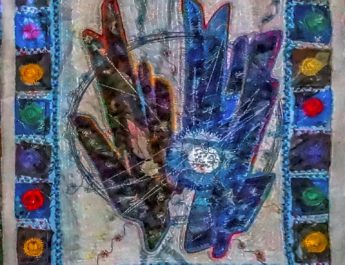Isaiah 55:1-5
Ordinary A36
1 Ho,A everyone who thirsts,B
come to the waters;
and you that have no money,C
come, buy and eat!D
Come, buy wineE and milkF
without money and without price.
A “ho” = ho. This is ah, woe, alas, or O. It is onomatopoeia for an expression of pain, grief, or woe – also for calling attention to.
B “thirsts” = tsame. 9x in OT. From tsame (to thirst in a literal or figurative sense). This is thirsty or dry in a literal or figurative sense.
C “money” = keseph. From kasaph (to long for, be greedy; to become pale). This is silver or money.
D “eat” = akal. To eat or consume in a literal or figurative sense.
E “wine” = yayin. Root may mean to effervesce, referring to the fermentation process. This is wine, grape, or banquet. It can imply intoxication.
F “milk” = chalab. Perhaps from the same as cheleb (fat, finest, marrow; fat in a literal or figurative sense; the richest or best part). This is milk or cheese or suckling.
2 Why do you spend your money for that which is not bread,G
and your laborH for that which does not satisfy?I
Listen carefullyJ to me, and eat what is good,K
and delightL yourselvesM in rich food.N
G “bread” = lechem. From lacham (to eat, feed on). This is bread, food, loaf. It can refer to food more generally for people or for animals.
H “labor” = yegia. 16x in OT. From yaga (to work, become weary, to gasp or be exhausted). This is that which comes from labor – product, possession, fruit, toil, wages, etc.
I “satisfy” = sobah. 5x in OT. From soba (abundance, fullness, satiation; satisfied with food or figuratively joy); from saba (to be sated or satisfied, have plenty or enough in a literal or figurative way). This is satisfied, abundant, or sufficient.
J “listen carefully” = shama + shama. Shama is to hear, call, consent, or consider. It implies listening intelligently, giving attention, and, because of these two factors, obedience and action are often implied. The word is repeated twice – the second time as an Infinitive Absolute. The Infinitive Absolute serves to emphasize the sentiment of the word. It is rather like Foghorn Leghorn’s speech pattern, “I said, I said.”
K “what is good” = tob. This is good, beautiful, pleasant, agreeable, bountiful, at ease. This word is used for goodness as a concept, a good thing, a good person. This can refer to prosperity and welfare as well as joy, kindness, sweetness, and graciousness. So, this is ethically good, but also enjoyably good.
L “delight” = anog. 10x in OT. This is soft or delicate. Figuratively, it can mean luxurious or effeminate. Also, a dainty, delight, or joke.
M “yourselves” = nephesh. Related to naphash (to refresh or be refreshed). This is soul, self, person, emotion. It is a breathing creature. Can also refer to appetites and desires.
N “rich food” = deshen. 15x in OT. From dashen (to be fat, become greast, be anointed or prosperous; can also mean to remove ashes from the fat offered for sacrifice). This is the ashes from that fat, fatness more broady speaking, or, figuratively abundance.
3 Incline your ear, and come to me;
listen, so that you may live.
I will makeO with you an everlastingP covenant,Q
my steadfast, sureR loveS for David.T
O “make” = karath. This is to cut down, cut off, or make a covenant (idiom for making a covenant is “to cut a covenant”). It can also mean to destroy, fail, or consume.
P “everlasting” = olam. This is a long scope of time whether in the past (antiquity, ancient time) or in the future (eternal, everlasting).
Q “covenant” = berit. Perhaps from barah (to eat, choose, make clear); perhaps from bar (grain, wheat); from bara (to select, purify, cleanse, test, brighten, polish). This is a compact, covenant, alliance, treaty, or league.
R “sure” = aman. This is to believe, endure, fulfill, confirm, support, be faithful. It is to put one’s trust in, be steadfast. Figuratively, this is to be firm, steadfast, or faithful, trusting, believing, being permanent, morally solid. This is where the word “amen” comes from.
S “steadfast…love” = chesed. From chasad (being good, kind, merciful; may mean bowing one’s neck as is done in the presence of an equal for courtesy’s sake; so, if one in a superior position is treating you like an equal, that is what is captured here). This is favor, goodness, kindness, loving kindness, pity, reproach, or a good deed. When done by God to humanity, this is mercy/loving kindness. When done by humanity to God, it is piety.
T “David” = David. From the same as dod (beloved, love, uncle); the root may mean to boil, which is used figuratively to describe love. So, this implies someone you love such as a friend, a lover, or a close family member like an uncle. David’s name likely means something like “beloved one.”
4 See,U I made him a witnessV to the peoples,W
a leaderX and commander for the peoples.
U “see” = hinneh. From hen (lo! Behold! If, though; an expression of surprise). This is to draw attention, show suddenness or surprise, or to emphasize the importance of the coming statement. See! Lo! Behold!
V “witness” = ed. From ud (to admonish, repeat, duplicate, testify, restore, record, relieve). This is a witness, testimony, or one who records testimony. It can also refer to a prince.
W “peoples” = leom. Root may refer to gathering. This is people, a community, or a nation.
X “leader” = nagid. From nagad (this is to declare, make conspicuous, stand in front, manifest, predict, explain). This is a commander or leader as the one who stands at the front, whether in a military, religious, or civic setting. It can also mean honorable or noble in an abstract sense.
5 See,Y you shall callZ nationsAA that you do not know,BB
and nations that do not know you shall run to you,
Y “see” = hen. Related to “see” in v4. See note U above.
Z “call” = qara. This is to call or call out – to call someone by name. Also used more broadly for calling forth.
AA “nations” = goy. From the same root as gevah (the back, person, or body); related to gev (among); related to gaah (to rise up). This is nation or people. Often used to refer to Gentiles or foreign nations. It can also be used figuratively for a group of animals. This is where the Yiddish “goy” comes from.
BB “know” = yada. This is to know, acknowledge, advise, answer, be aware, be acquainted with. Properly, this is to figure something out by seeing. It includes ideas of observation, recognition, and care about something. It can be used causatively for instruction, designation, and punishment.
because of the LordCC your God,DD the Holy OneEE of Israel,FF
for he has glorifiedGG you.
CC “Lord” = YHVH. From havah (to be, become) or hayah (to come to pass, become, be). This is the name of the God of Israel, the self-existent and eternal one, the tetragrammaton. This pronunciation has been lost to time so “Lord” is generally used in its place.
DD “God” = Elohim.
EE “Holy One” = qadosh. From qodesh (set apart and so sacred; God is different from us and so God is holy/set apart; things we dedicate to God’s service are set apart for God and so they, too, are holy); related to qadash (set apart, consecrated, hallowed, sanctified; something or someone set apart for a holy purpose or use – ceremonially or morally clean). This is sacred or holy in a ritual or moral sense. As a noun, it refers to a holy one (like a saint or angel), a holy place (the sanctuary), or God (the Holy One).
FF “Israel” = yisrael. From sarah (to persist, exert oneself, contend, persevere, wrestle, prevail) + el (God or god). This is God strives or one who strives with God; new name for Jacob and for his offspring. This refers to the people and to the land.
GG “glorified” = paar. 14x in OT. This is to beautify or adorn, to gleam. Thus, it can refer to showing honor or glorifying someone. It can also mean to boast or to shake a tree for harvest.
Image Credit: “Woman with Bird” by Ursula Malbin, 1978.




